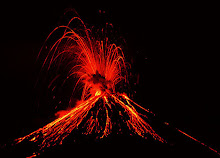
Also known as tropical cyclones, a hurricane is a very powerful force of spinning air that can cause so much damage to both property and life. It is of the element air. It is a storm system that is identified by a low pressure center and thunderstorms around the edge that create strong winds and heavy rain that causes flooding.
They are called tropical cyclones because they form almost only in tropical climates. When moist air rises it creates heat that the cyclone feeds on. This results in the condensation of water vapour that is contained in the moist air. Their energy is of a different heat mechanism to that of other cyclonic winstorms like the European windstroms hence their classification as the "warm core" strom systems.
In the Nortern hemisphere a cyclone rotates anti-clockwise and in the Southern hemisphere it rotates clockwise. They are called different names depending on their strength and location e.g. hurricane od typhoon.
As well as producing heavy rain, strong winds, high waves and strom surges they are also capable of producing tornadoes. They start over big bodies of warm water and they lose their energy and strngth if they travel over land. Although they don't travel too far inland, the rain that falls from them and the strom surges caused by them can cause flooding up to 40 kilometres from the coast.
Although they can cause devastating effects on human population they can also relvieve droughts. And although they only start in tropical areas they can travel to temperate latitudes which plays an important role on the global atmospheric circulation mechanism!
They can be devastating but they help maintain equilibrium in the Earth's troposphere and they also maintain a relatively warm and stable temperature worldwide.
I got this image from www.weatherwizkids.com/hurricane1.htm

No comments:
Post a Comment